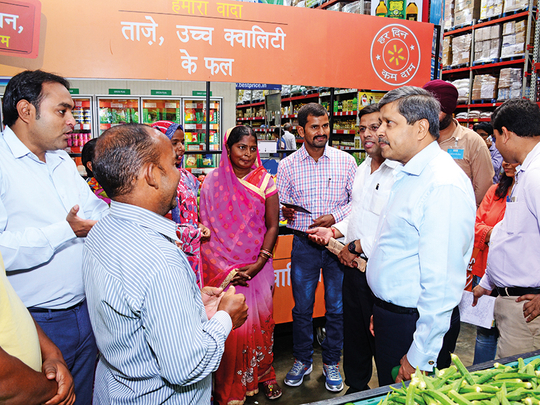
DUBAI: An Indian start-up pitted against the full might of an American behemoth. This has been a constant sub-theme in the Flipkart versus Amazon narrative, pitting Flipkart’s founders — the Bansals, Sachin and Binny (but not related) — against Jeff Bezos.
It is a soundtrack that has played out well all through the years the two e-tailers went head-to-head, with Bezos committing billions to close the gap with Flipkart, which launched in 2007.
And even when Flipkart kept bringing on board new investors — global names such as SoftBank, Microsoft and eBay, among others — the Bansals vs Bezos still had a nice ring to it.
Now, that script requires a drastic rewrite … with Walmart putting its sizeable imprint on Flipkart’s shareholding, all 77 per cent of it. And one of the Bansals also exited the stage — with Sachin selling his 5.96 per cent stake and taking a complete break from any Flipkart association.
The parting happened well away from any media limelight. There was a solitary social media post and that was that for one of India’s most high-profile start-up chieftains over the last decade.
Will Walmart retain the Flipkart strategy or insert something of its own post the deal? A Walmart spokesperson was categorical: “Flipkart is a powerful brand and we have no intention to change it. We plan to leverage the combined strengths of both companies — but maintain distinct brands.
“Walmart and Flipkart will operate as separate entities, but with the intention, over time, to leverage the combined strengths of both. To execute on Flipkart’s India-focused strategy, Flipkart’s strong local leadership team will continue to lead the business, with equity in the new structure.”
That means Binny Bansal remains in place within the new dispensation and continue as the public face of Flipkart.
What could change on the corporate side for Flipkart will be transitioning from being privately-owned to a publicly-listed enterprise “in the future”, as Walmart says in a statement after the $16 billion deal. Now, that transition process could be accelerated under Walmart’s ownership, market sources say.
India’s online shopping space is “basically a two-horse race now as both (Amazon and a Walmart-led Flipkart) have solid muscle power and their own war chest,” said Shripal Gandhi, CEO of Swipe Technologies, which sells “Swipe” branded mobile phones and other gadgets on the two portals. “Snapdeal and Shopclues are not in the picture.”
But selling online in India may have growing volumes, but profitability could still be elusive. “From the recent GMV (gross merchandise value) numbers, still 20-30 per cent discount is offered over the MRP (maximum retail price),” said Gandhi. “Hence, its looks far from being operationally profitable.” (Gross merchandise value is an online shopping metric, indicating total sales value for merchandise sold through a portal.) In recent quarters, Amazon made significant strides in closing the lead Flipkart had built over years, market sources say. Those slickly made TV commercials sure struck a chord with Indian consumers, and the deep discounts on merchandise didn’t have hurt either.
Another advantage Amazon has been having of late is through its Prime Video subscriptions. In India, these web TV services caught on extremely fast and propelled more consumers into the wider Amazon universe.
“Customer brand loyalty in the case of Flipkart and Amazon is akin to Coke and Pepsi,” said Bakul Gala, Director at BrandMark Group. “While you would ask for your preferred drink at the restaurant, you will easily settle for the other one if that’s not available. “Now, after the Walmart deal, the war is going to be more intense. In a way it will be good for consumers. Let’s accept that Indians have barely scratched the online shopping surface when compared to the US.
“With 530 million out of 900 million subscribers having smart phones, the game has just begun. Combined with the 4G network launches by JIO, Vodafone, Airtel and others, it is a no-brainer that online shopping is going to explode in India.” Now, if only the Indian government played its part and eased up rules just that little bit.
In India, online shopping is still a world of discounts
Discounting works wonders in India, offline and online. For India’s online shopping giants, it’s a 24x7 effort to come up with price points that would convince shoppers to part with their rupee and overlook what the competition has to offer.
But some vendors are hoping that the Walmart buyout of Flipkart will not make it more of the same, from a discounting perspective.
“I believe with the takeover, this should substantially get curtailed as traditionally no business in the US is built on discounting,” said Shripal Gandhi, CEO of Swipe Technologies. “Amazon was forced to go for discounting in India as they didn’t have a choice to remain competitive in the marketplace.
“I really hope that moving forward the strategy is more focused on building customer experience and loyalty.”
—M. N.











